Beware of Confident Women with Swords
A Tale of Beheadings and Cheese
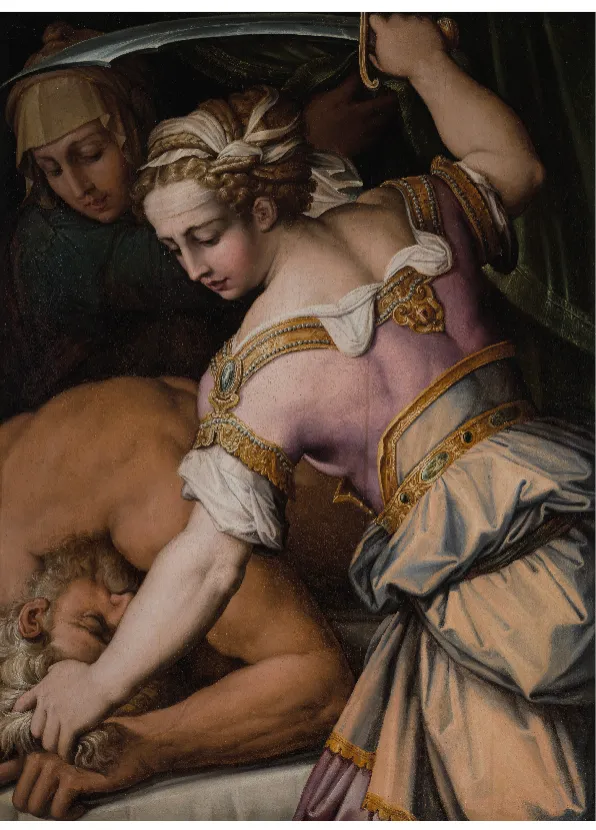
This is Life as a Sacred Text, an expansive, loving, everybody-celebrating, nobody-diminished, justice-centered voyage into one of the world’s most ancient and holy books. More about the project here, and to subscribe, go here: 🌱
If you’re not a subscriber, you can get free essays like these weekly(ish), and you can become a paid subscriber for even more heart, soul, and brain-nourishing goodies and to support the labor that goes into this work.
SO:
Happy Hanukah!
In honor of the Festival of Lights, we’re going to look at one of my favorite extra-Biblical stories, with some very light annotation from me, because lots of people know a bit about the Book of Judith but haven’t really spent time in the text. And the text is dope; it’s worth your time.
It has no canonical status whatsoever in Judaism, but it’s about a Jewish woman saving Jews, and though it tells of an Assyrian army, extant Hebrew versions name figures like Antiochus IV, aka the Selucid (Greco-ish) king who defiled the Jerusalem Temple and prompted the Maccabean uprising; the theory goes that this is a tale (real or mythic) about the Selucids, and talks about the “Assyrians” as a way of being a bit, uh, circumspect. That’s why this is a Hanukah text, even though it’s not technically a biblical text.
So this is an abridged version of the Book of Judith. It is all direct from a translation of that book, but condensed for focus on plot and key elements. I am, of course, also including Judith art because JUDITH ART IS THE BEST ART. There’s so much more I couldn’t include, but as you see, this post is already pretty long as is. Let it be known that my (current) favorite Judiths are by the contemporary Black artist Kehinde Wiley—here and here. (A thoughtful analysis of them here.) Not embedding them because permission/rights issues.
The Book of Judith is traditionally read by Sephardi women on the 7th night of Hanukkah and by Ashkenazi women on the 8th night.
This is her time. Let’s do this thing.
As the story opens, the “Assyrian” (aka Selucid) army has come to the town of Bethulia (which a) didn’t actually exist in the Land of Israel and b) means, basically, “Virgintown,” so do with that what you want, lit critics—I mean, “Virginia”, but just for literary effect, here.) They have surrounded the town. The town’s options are not great at this point.
The Israelites cried to God their God, for they were disheartened, since all their enemies had them surrounded, and there was no way of escaping from them.
The whole Assyrian army, infantry, chariots, and cavalry, kept them thus surrounded for thirty-four days. All the reservoirs of water failed the inhabitants of Bethulia, and the cisterns ran dry, so that on no day did they have enough water to drink, for their drinking water was rationed. Their children were listless, and the women and youths were fainting from thirst and were collapsing in the streets and gateways of the city, with no strength left in them.
If only there was someone who could help save them!
Judith was living as a widow in her home for three years and four months. She set up a tent for herself on the roof of her house, put sackcloth about her waist, and wore widow’s clothing. She fasted all the days of her widowhood, except sabbath eves and sabbaths, new moon eves and new moons, feast days and holidays of the house of Israel. She was beautiful in appearance and very lovely to behold. Her husband, Manasseh, had left her gold and silver, male and female servants, livestock and fields, which she was maintaining. No one had a bad word to say about her, for she feared God greatly.
OK: Hot. Rich. Pious. Widow: Check.
So when Judith heard of the harsh words that the people, discouraged by their lack of water, had spoken against their ruler, and of all that Uzziah had said to them in reply, swearing that he would hand over the city to the Assyrians at the end of five days, she sent her maid who was in charge of all her things to summon Uzziah, Chabris, and Charmis, the elders of her city. When they came, she said to them:
“Listen to me, you rulers of the people of Bethulia. What you said to the people today is not right. You pronounced this oath, made between God and yourselves, and promised to hand over the city to our enemies unless within a certain time God comes to our aid. Who are you to put God to the test today, setting yourselves in the place of God in human affairs? And now it is God you are putting to the test, but you will never understand anything!”
AGHHHH. Once again, (from the sounds of it) she has to deal with the incompetent numnuts in charge, but this time they’re ready to, like, hand over the whole city to the enemy? USELESS.
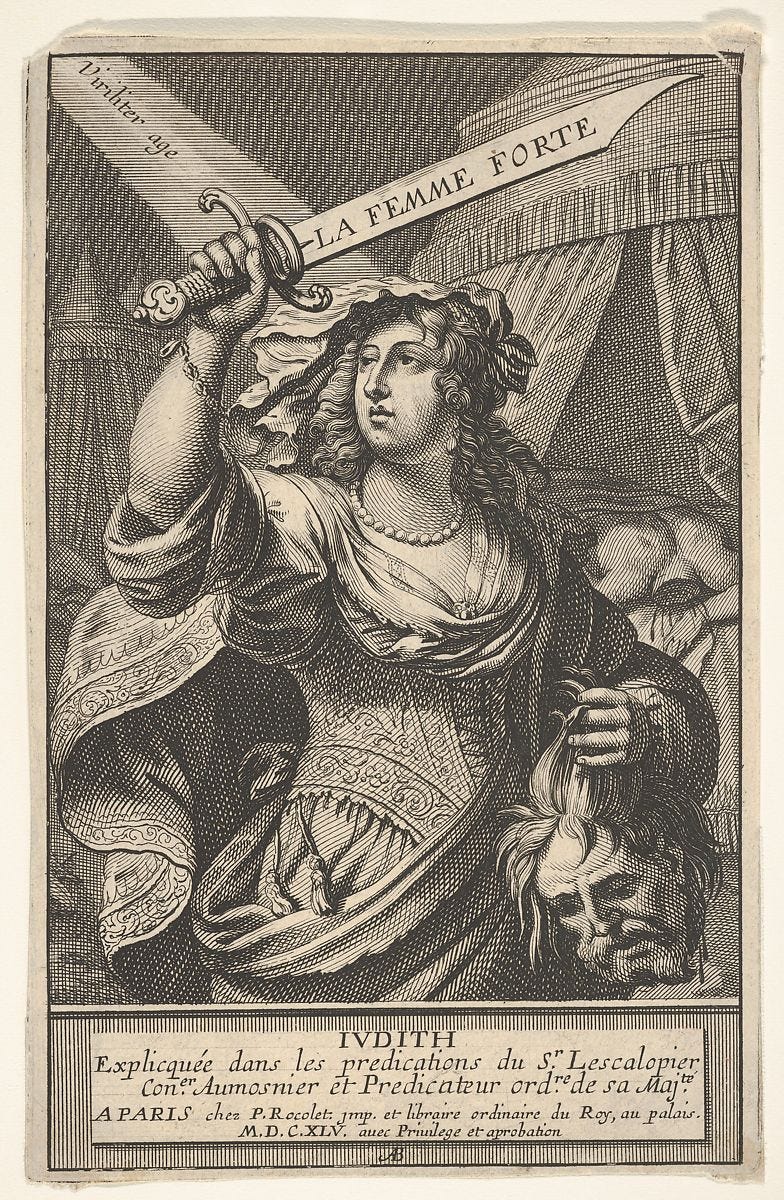
Then Uzziah said to her: “The people were so thirsty that they forced us to do for them as we have promised, and to bind ourselves by an oath that we cannot break. But now, since you are a devout woman, pray for us that God may send rain to fill up our cisterns. Then we will no longer be fainting from thirst.”
Well, we can’t think of anything else to do, so maybe you could, like, pray for us??
Yep: their crisis strategy is “thoughts and prayers.” Great work, guys.
Then Judith said to them: “Listen to me! I will perform a deed that will go down from generation to generation among our descendants. 🔥🔥🔥🔥🔥🔥
Stand at the city gate tonight to let me pass through with my maid; and within the days you have specified before you will surrender the city to our enemies, God will deliver Israel by my hand.
You must not inquire into the affair, for I will not tell you what I am doing until it has been accomplished.”
You guys are useless. USELESS! I’ve got this. Shut up. Don’t ask questions.
She took off the sackcloth she had on, laid aside the garments of her widowhood, washed her body with water, and anointed herself with rich ointment. She arranged her hair, put on a diadem, and dressed in the festive attire she had worn while her husband, Manasseh, was living. She chose sandals for her feet, and put on her anklets, bracelets, rings, earrings, and all her other jewelry. Thus she made herself very beautiful, to entice the eyes of all the men who should see her.
Lots of interesting parallels to the Book of Esther, here. This is one—the elaborate preparations and ointment-ing to meet (SPOILER, sorry) the powerful man in charge in whose hands her fate & the fate of her people rests. Though of course instead of being a virgin, like Esther, she’s a widow, instead of being (presumably) poor, she’s wealthy, instead of her taking off clothes of mourning, Mordechai puts them on, instead of starting out for individual survival, she starts with the communal battle and, as we’ll see, her relationship to Jewish practice (prayer, food) is much starker—though, interestingly, the Septuagint, the Greek translation of the Hebrew Bible, added in all this stuff into Esther to make it seem like she was keeping kosher in the Persian palace the whole time. While also somehow magically hiding her Jewishness. (There’s also a difference—spoiler alert—viz who goes through with doing what deed, and in what methods they use to make change.)
She gave her maid a skin of wine and a jug of oil. She filled a bag with roasted grain, dried fig cakes, and pure bread. She wrapped all her dishes and gave them to the maid to carry.
SNACKS! Why go anywhere without snax??? But seriously, this whole little three sentence interlude seems cute here, but it’s important. NB.
As Judith and her maid walked directly across the valley, they encountered the Assyrian patrol. The men took her in custody and asked her, “To what people do you belong? Where do you come from, and where are you going?”
She replied: “I am a daughter of the Hebrews, and I am fleeing from them, because they are about to be delivered up to you as prey. I have come to see Holofernes, the ranking general of your forces, to give him a trustworthy report; in his presence I will show him the way by which he can ascend and take possession of the whole hill country without a single one of his men suffering injury or loss of life.”
Oh, I’m sure you big. strong. men. can protect me, can’t you? And I’ll hook you up with juicy intel, to boot. *bats eyes*
When the men heard her words and gazed upon her face, which appeared marvelously beautiful to them, they said to her, “By hastening down to see our master, you have saved your life. Now go to his tent; some of us will accompany you to hand you over to him. When you stand before him, have no fear in your heart; give him the report you have given us, and he will treat you well.”
Wait until our general sees that we’re bringing him a hot chick with insider information. He’s gonna be stoked. Because nothing is ever too good to be true—definitely not in a war zone! No siree! So they take him to see their boss, the Big Mister H. She introduces herself, they start to chat.
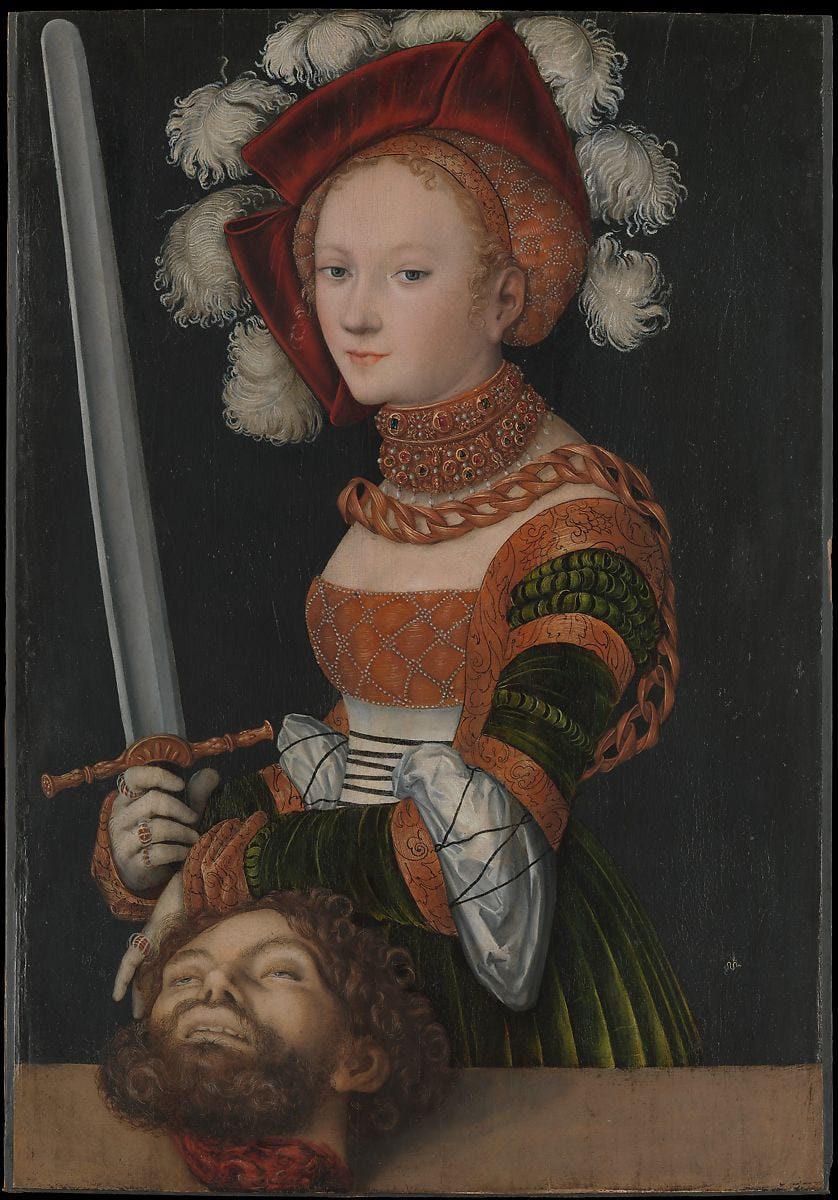
Then Holofernes said to her: “Take courage, woman! Have no fear in your heart! I have never harmed anyone who chose to serve Nebuchadnezzar, king of all the earth. As for your people who live in the hill country, I would never have raised my spear against them, had they not insulted me. They have brought this upon themselves. But now tell me why you have fled from them and come to us? In any case, you have come to safety. Take courage! Your life is spared tonight and for the future. No one at all will harm you. Rather, you will be well treated, as are the servants of my lord, King Nebuchadnezzar.”
So much thin-skinned toxic masculinity, so much victim blaming, so much abuser evasion of responsibility. I wouldn’t have hurt them, but they insulted me. So I had no choice but to buy this entire social media website in order to try to take them down. But you’re easy on the eyes and you’ve said you believe in free speech, so I’ll protect you, lil’ missy!
Judith answered him: “Listen to the words of your servant, and let your maidservant speak in your presence! I will say nothing false to my lord this night. If you follow the words of your maidservant, God will successfully perform a deed through you, and my lord will not fail to achieve his designs. Your servant is, indeed, a God-fearing woman, serving the God of heaven night and day. Now I will remain with you, my lord; but each night your servant will go out into the valley and pray to God. God will tell me when they have committed their offenses. Then I will come and let you know, so that you may march out with all your forces, and not one of them will be able to withstand you. I will lead you through the heart of Judea until you come to Jerusalem, and there in its center I will set up your throne. You will drive them like sheep that have no shepherd, and not even a dog will growl at you. This was told to me in advance and announced to me, and I have been sent to tell you.”
“I will say nothing false to my lord this night.” That is, of course, a loaded statement. And when you read and reread this passage choosing to believe her in this, what she’s saying—and what, perhaps Holofernes hears—starts to get reaaaally interesting.
(Who is “my lord”, then?)
Note also the important stipulation that she has to go out and pray each evening.
Her words pleased Holofernes and all his attendants. They marveled at her wisdom and exclaimed, “No other woman from one end of the earth to the other looks so beautiful and speaks so wisely!” Then Holofernes said to her: “God has done well in sending you ahead of your people, to bring victory to our hands, and destruction to those who have despised my lord. You are not only beautiful in appearance, but you are also eloquent. If you do as you have said, your God will be my God. you will live in the palace of King Nebuchadnezzar and be renowned throughout the whole earth.”
Then he ordered them to lead her into the room where his silver dinnerware was kept, and ordered them to set a table for her with his own delicacies to eat and his own wine to drink. But Judith said, “I cannot eat any of them, because it would be a scandal. Besides, I will have enough with the things I brought with me.”
Judith keeps kosher! She’s not gonna eat any of that pagan-Hellenistic Selucid Assyrian food. She’s got this nice spread of the grain, fig cakes and bread in her food bag; she doesn’t need his treyf. (Do you picture the food bag as one of those cloth reusable bags people bring to pick up a few things at the farmer’s market or the organic co-op? I kind of do. What nonprofit logo or clever progressive slogan do you think is printed on the side?)
Holofernes asked her, “But if your provisions give out, where can we get more of the same to provide for you? None of your people are with us.”
Is this a moment of considerate inclusion? Did he pay attention in the Selucid Army DEI training? Or is he gently suggesting that she may as well just eat with him?
Judith answered him, “As surely as you live, my lord, your servant will not use up her supplies before the Lord accomplishes by my hand what he has determined.”
If you were Holofernes now, you probably also wouldn’t be thinking much is amiss about this woman. But whew, in hindsight.
Then the attendants of Holofernes led her to her tent, where she slept until the middle of the night. Toward the early morning watch, she rose and sent this message to Holofernes, “Give orders, my lord, to let your servant go out for prayer.”
So Holofernes ordered his guards not to hinder her. Thus she stayed in the camp three days. Each night she went out to the valley of Bethulia, where she bathed herself at the spring of the camp. After bathing, she prayed to the Lord, the God of Israel, to direct her way for the triumph of her people. Then she returned purified to the tent and remained there until her food was brought to her toward evening.
So they’ve got a little routine going.
On the fourth day Holofernes gave a banquet for his servants alone, to which he did not invite any of the officers. And he said to Bagoas, the eunuch in charge of his personal affairs, “Go and persuade the Hebrew woman in your care to come and to eat and drink with us. It would bring shame on us to be with such a woman without enjoying her. If we do not seduce her, she will laugh at us.”
In case you were wondering how old toxic masculinity is? Toxic masculinity dates back at least to the Septuagint, the first translation of the Hebrew Bible (plus some stuff that didn’t make it into canon!) into Greek (ca 3rd-2nd c. BCE) which includes the earliest version of Judith that we have. Rape culture dates back even earlier, by a lot. Probably at least back to the development of patriarchy. But this Holofernes Access Hollywood “It’s just locker room talk” business is serious—we see the insecurities up top. And yes, there’s a writer1 who noted that women’s great fear is that men will kill them, whereas men’s great fear is that women will laugh at them. It’s right here.
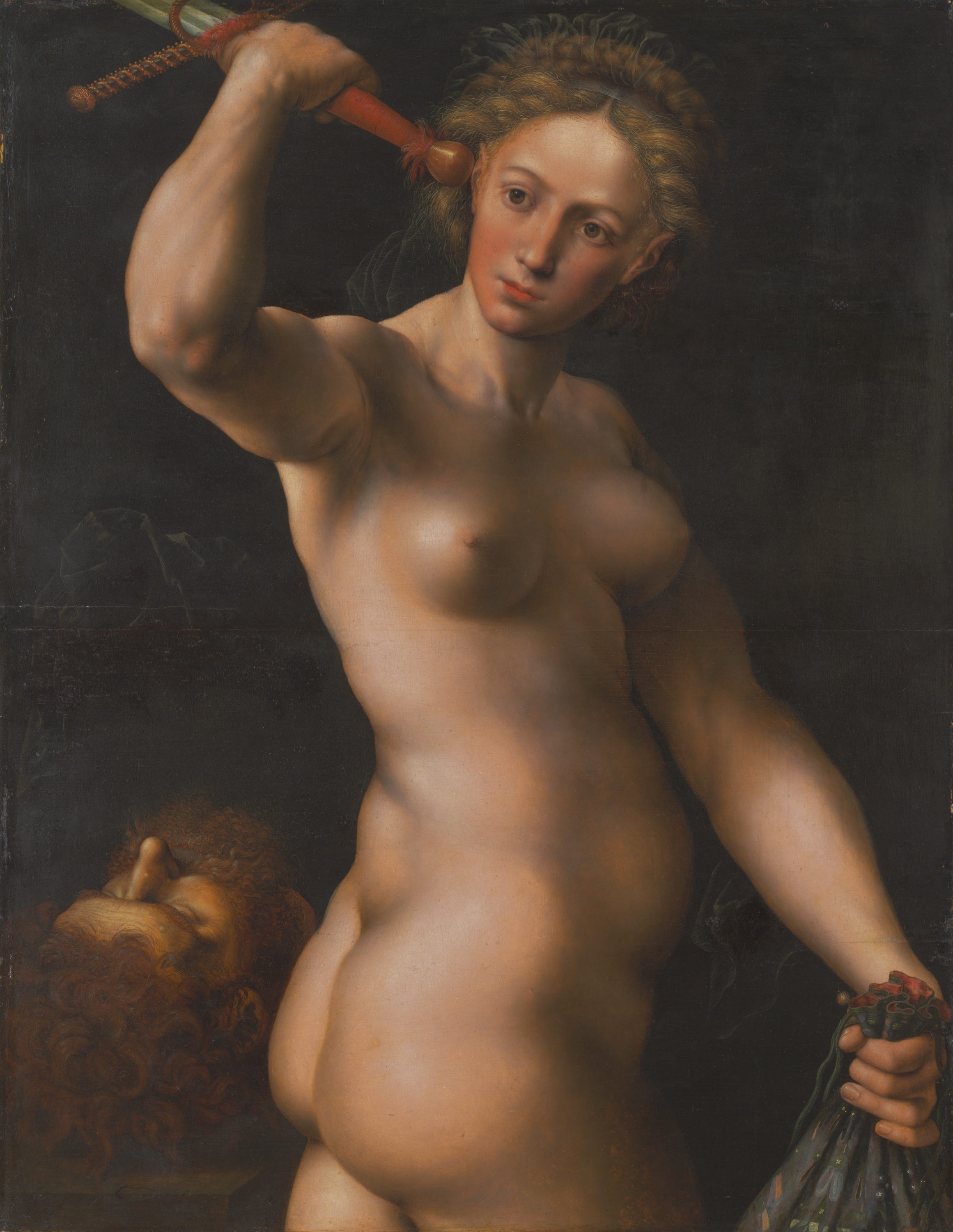
So Bagoas left the presence of Holofernes, and came to Judith and said, “So lovely a maidservant should not be reluctant to come to my lord to be honored by him, to enjoy drinking wine with us, and to act today like one of the Assyrian women who serve in the palace of Nebuchadnezzar.”
It’s never just the sexual predators. It’s also the enablers, who are at least as repugnant, if not worse.
Judith replied, “Who am I to refuse my lord? Whatever is pleasing to him I will promptly do. This will be a joy for me until the day of my death.”
Read for the double entendres. Again: she’s not lying!
So she proceeded to put on her festive garments and all her finery. Meanwhile her servant went ahead and spread out on the ground opposite Holofernes the fleece Bagoas had furnished for her daily use in reclining while eating.
Then Judith came in and reclined. The heart of Holofernes was in rapture over her and his passion was aroused. He was burning with the desire to possess her, for he had been biding his time to seduce her from the day he saw her. Holofernes said to her, “Drink and be happy with us!”
Judith replied, “I will gladly drink, my lord, for today is the greatest day of my whole life.” She then took the things her servant had prepared and ate and drank in his presence. Holofernes, charmed by her, drank a great quantity of wine, more than he had ever drunk on any day since he was born.
Tradition has it that she fed him salty cheese in order to get him to drink more wine. That’s why Judith and Hanukah are sometimes associated with cheese. And why fried mozzarella sticks (or halloumi, or…) are the perfect 8th night of Hanukah food.
When it grew late, his servants quickly withdrew. Bagoas closed the tent from the outside and dismissed the attendants from their master’s presence. They went off to their beds, for they were all tired because the banquet had lasted so long.
Judith was left alone in the tent with Holofernes, who lay sprawled on his bed, for he was drunk with wine.
Judith had ordered her maidservant to stand outside the bedchamber and to wait, as on the other days, for her to come out; she had said she would be going out for her prayer. She had also said this same thing to Bagoas.
Routine, right? Every day she goes out to pray to God (for, well, the defeat of her enemies. These guys.)
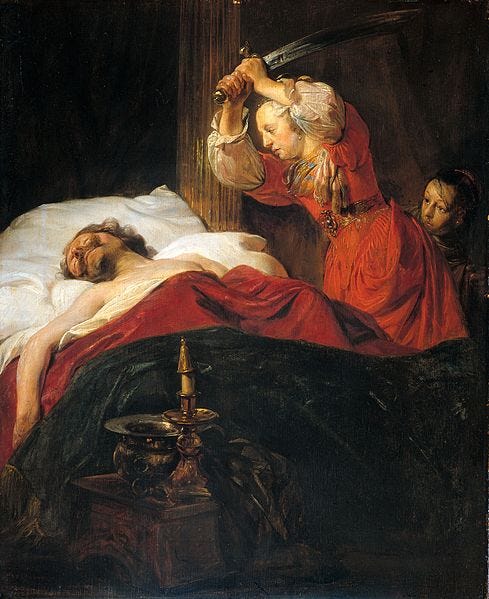
When all had departed, and no one, small or great, was left in the bedchamber, Judith stood by Holofernes’ bed and prayed silently, “O Lord, God of all might, in this hour look graciously on the work of my hands for the exaltation of Jerusalem. Now is the time for aiding your heritage and for carrying out my design to shatter the enemies who have risen against us.”
She went to the bedpost near the head of Holofernes, and taking his sword from it, she drew close to the bed, grasped the hair of his head, and said, “Strengthen me this day, Lord, God of Israel!”
Then with all her might she struck his neck twice and cut off his head.
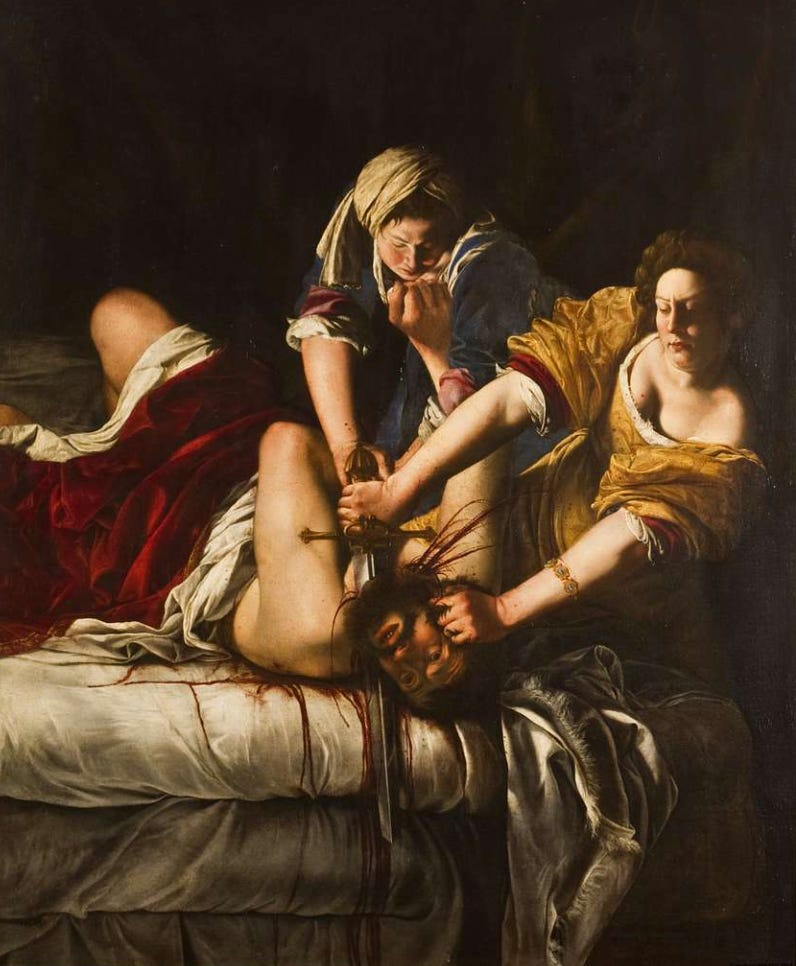
She rolled his body off the bed and took the canopy from its posts. Soon afterward, she came out and handed over the head of Holofernes to her maid, who put it into her food bag.
SHE PUT HIS HEAD INTO THE FOOD BAG.
SHE PUT HIS HEAD INTO THE FOOD BAG, Y’ALL.
The perfection of this woman.
She’s been walking around all the time with this food bag. Because she keeps kosher—actually tho.
But also now everybody knows her as the lady with the food bag. So now she can nonchalantly walk out WITH THE GENERAL’S HEAD IN HER FOOD BAG.
I…
I MEAN.
Then the two went out together for prayer as they were accustomed to do.
Right? All of the soldiers are used to seeing them go out into the valley all the time. Because on the one hand, she’s genuinely pious, but also, like, she is casually wandering out the way that they’re used to, which is a convenient way to step out of the camp at this same hour that they always do.
*chef’s kiss*
They passed through the camp, and skirting that valley, went up the mountain to Bethulia, and approached its gates. From a distance, Judith shouted to the guards at the gates: “Open! Open the gate! God, our God, is with us. Once more he has shown his strength in Israel and his power against the enemy, as he has today!”
We’re back! Wait until you see!
When the citizens heard her voice, they hurried down to their city gate and summoned the elders of the city. All the people, from the least to the greatest, hurriedly assembled, for her return seemed unbelievable. They opened the gate and welcomed the two women. They made a fire for light and gathered around the two. Judith urged them with a loud voice: “Praise God, give praise! Praise God, who has not withdrawn his mercy from the house of Israel, but has shattered our enemies by my hand this very night!”
Then she took the head out of the bag, showed it to them, and said: “Here is the head of Holofernes, the ranking general of the Assyrian forces, and here is the canopy under which he lay in his drunkenness.
The Lord struck him down by the hand of a female!”
Damn Skippy God did.
Then Judith said to them: “Listen to me, my brothers and sisters. Take this head and hang it on the parapet of your wall.”
Heh. The ultimate showoff. Then the army—assault enablers and all—woke up, found a headless general, and eventually looked up and saw his head up on the parapet of the Bethulia city wall, and understood exactly what happened. That was pretty much the end of the “surround and dominate the city” plan.
And, though unlike Esther, Judith didn’t sleep with the guy, as in the Book of Esther, there was a reversal—the Jews who had been desperate at the beginning, about to be stripped of everything they have, then get to plunder and benefit from the enemy’s camp, and to have a celebration:
For thirty days all the people plundered the camp, giving Judith the tent of Holofernes, with all his silver, his beds, his dishes, and all his furniture. She took them and loaded her mule, hitched her carts, and loaded these things on them. All the women of Israel gathered to see her, and they blessed her and performed a dance in her honor. She took branches in her hands and distributed them to the women around her, and she and the other women crowned themselves with olive leaves.
THAT’S RIGHT. CROWN YOURSELF WHEN YOU DO GREAT THINGS. GIVE YOURSELF THE PROPS. GIVE OTHER PEOPLE SOME CROWNS, TOO. CROWNS FOR EVERYONE.
Then, at the head of all the people, she led the women in the dance, while the men of Israel followed, bearing their weapons, wearing garlands and singing songs of praise.
When those days were over, all of them returned to their inheritance. Judith went back to Bethulia and remained on her estate. For the rest of her life she was renowned throughout the land.
Many wished to marry her, but she gave herself to no man all the days of her life from the time her husband, Manasseh, died and was gathered to his people.
SHE GAVE HERSELF TO NO MAN.
No time for that ish. (Between the incompetent elders of her city and the rapists in the Selucid/Assyrian army, who can blame her? She had the one good marriage, now she has enough to live on and her freedom.
Her fame continued to increase, and she lived in the house of her husband, reaching the advanced age of one hundred and five. She set her maid free.
Better late than never? You would have thought immediately after her maid helped her behead a guy would have been a nicer time, but I’m glad she got eventually that the liberation that she, personally so enjoyed should be extended to others as well.
And when she died in Bethulia, they buried her in the cave of her husband, Manasseh. Before she died, she distributed her property to the relatives of her husband, Manasseh, and to her own relatives.
Give it away, give it away, give it away now. (Give some of it to your maid who helped behead the guy at significant personal risk too, I hope?)
Anyway, that’s the (abridged) tale of Judith. Worth the ride, I hope. I think so. I think she and this text are badass, and I’m happy every time I work my way through it.
May you all have a wonderful week filled with inspiration, passion, the understanding of when you just gotta go do a thing yourself, and the wisdom to see all the various uses for a reusable bag.
Every year, the musician Dave Grohl releases a song a night as the Hanukkah Sessions. Perfectly, two nights ago they released this live version with Karen O of the Yeah Yeah Yeahs singing her “Heads Will Roll.” Seemed the right note on which to end.
FEMINIST BUZZKILL FOOTNOTE do not read unless you feel like going there (because that’s the kind of gal I am): Yeah, I have complicated feelings about Atwood now, not gonna lie. The premise of Handmaid’s Tale, which I have read many many times, is that basically everything she described was things that had already happened to women of color at various times and places in the world—most of which had happened to Black and Indigenous women in the US—was that the novelty was just that they were happening to white women. Which I at first took to be a pointed critique of white supremacy, but over time have wondered if that’s the case—it would have been a lot more artful to add two sentences somewhere to make it more explicit. But in any case the issue is got weirdly smug about the fall of Roe, never mind all the people who would die and suffer, be trapped in abuse and all the inequality that would be entrenched—it wasn’t a time to be cute, smirking, or to make it about her. (Notably the fall of Roe, in some ways, mirrored the Handmaid’s Tale in that the Hyde Amendment had long made it so that BIPOC were disproportionately already blocked from abortion access, because of the racist history of policy in this country and who was disproportionately on Medicaid, etc.—so again, now the thing is happening in a way that actually impacts white women, let’s be frank. Though the harm across the board should not be overstated.) I’m a little confused about where she is on trans issues, if I’m honest; I’ve seen her post what many read as transphobic material, and also material that seems to be distancing and trying to be more trans inclusive, though not actually by, like, real actual live trans people. So I dunno. I’m just laying out my very complicated, ambivalent feelings about Atwood in this long and rambling footnote, but her note about fears was super apt, so I shared it, have a nice day. ↩

